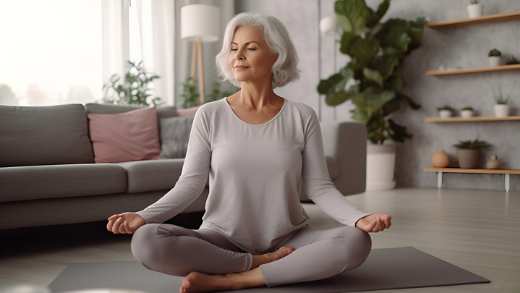All about the menopause
Find out more about the menopause, its causes and when it starts here.

What's the menopause?
The menopause is when a person stops having periods and can’t get pregnant naturally anymore. Usually it happens slowly – your periods start becoming less frequent over a few months or years, and eventually they just stop altogether. Sometimes it can happen suddenly when your period ends one month and then doesn’t return.
What causes the menopause?
The menopause is a natural part of aging that usually happens when your periods stop due to lower hormone levels. Footnote [1]
Your ovaries stop releasing eggs and your body produces significantly lower levels of oestrogen and progesterone. After this, your menstrual cycle stops and you can't conceive naturally any longer.
When does menopause start?
You’ll most likely be between 45 and 55 years old when your oestrogen levels start to get lower and the menopause starts. Footnote [1]
Perimenopause
The term perimenopause means 'around the time of menopause', and it’s used to describe the time your body takes to transition into the menopause. This ‘pre’ menopausal stage usually lasts about four years, but some people can experience it for anything from a few months to 10 years. Perimenopause ends when you’ve gone 12 consecutive months without having a period. Footnote [1]
Early and premature menopause
Sometimes people go through the menopause before they turn 40. We call this premature menopause, or premature ovarian insufficiency. Footnote [2] Premature menopause can either happen without an obvious cause or as a side effect of some treatments.
If you think you might be going through the menopause, it’s a good idea to speak to your GP. They might decide to do some tests to check your hormone levels and will talk to you about your symptoms and family history.
What your symptoms might look like
Going through the menopause can be tough, and most people will have some symptoms. Hot flushes, mood changes, menopause weight gain and menopause night sweats are just a few things you might experience because of the changes happening in your body.
Your symptoms could include:
- Hot flushes
- Night sweats
- Vaginal dryness (and feeling uncomfortable during sex)
- Having trouble sleeping
- Depression and anxiety
- A lower sex drive
- Memory problems or difficulty concentrating (people sometimes call this ‘brain fog’)
Managing the menopause
Going through the menopause is totally natural, but that doesn’t mean it’s easy to deal with. If you’re experiencing symptoms, the good news is that there are things you can do to make life easier.
The main treatment for menopause symptoms is HRT, which stands for ‘hormone replacement therapy’ – and it does just that: replaces the hormones you’re missing. A lot of your symptoms will happen because of low oestrogen levels, so oestrogen is the most important hormone you’ll need to replace. And if you have a uterus, you’ll also need progestogen to protect your uterine lining.
You can get HRT as tablets, implants, a gel, or skin patches. Taking HRT is not without certain risk, be it low, so it is important to talk to an expert about the risks and benefits and whether it'll suit you.
There are also a few things you can do that’ll help with specific symptoms:
- Hot flushes and menopause night sweats – Wear lighter clothes, take a cool shower before bed, use a fan, or regularly have cold drinks. You can also try avoiding spicy food, caffeine, smoking, and alcohol
- Mood changes – Get plenty of rest, exercise when you can, and try calming activities like yoga or tai chi. If your mood changes are affecting your life, it might be a good idea to speak to your GP about antidepressants or anti-anxiety medication
- Lower sex drive – You can get a testosterone gel which you rub on your tummy or the top of your leg, which can help boost your sex drive. You’ll need to see a specialist if you’d like to be prescribed this
- Vaginal dryness – There’s an oestrogen treatment that you can put directly into your vagina as a pessary, cream, or vaginal ring. You can use this alongside HRT, as well as vaginal moisturisers and lubricants which are easy to get over the counter, but please discuss this with your prescriber
- Weak bones – HRT, regular exercise, calcium/vitamin D supplements and a healthy diet rich in calcium can all help if you’re starting to develop weak bones or osteoporosis.
Myths about the menopause
Myth #1: Menopause starts when you turn 50
This is a myth because it’s different for everyone, really. The average age to start going through the menopause in the UK is 51, but it could start happening anywhere from your late 30s to your early 60s.
Myth #2: You’ll definitely gain weight during the menopause
Not everyone experiences menopause weight gain. If you do, there are things you can do to help. It’s really important to make sure you’re eating healthy, nutritious foods and exercising regularly, which will help with balancing your hormones, as well as any weight gain.
Myth #3: You’ll get weak bones during the menopause
You may develop osteoporosis as a result of menopause and ageing, but this does not apply to everyone. And having osteoporosis does not mean you will break your bones but there is an increased risk.
You can reduce your risk of osteoporosis by exercising regularly and focusing on weight-bearing and resistance exercise. You could also eat more calcium-rich foods, like leafy green veggies, dried fruit, tofu and yoghurt. Footnote [3]
Next article
Worried about GP and hospital wait times?
Here's how quickly you could get treated with health insurance.



